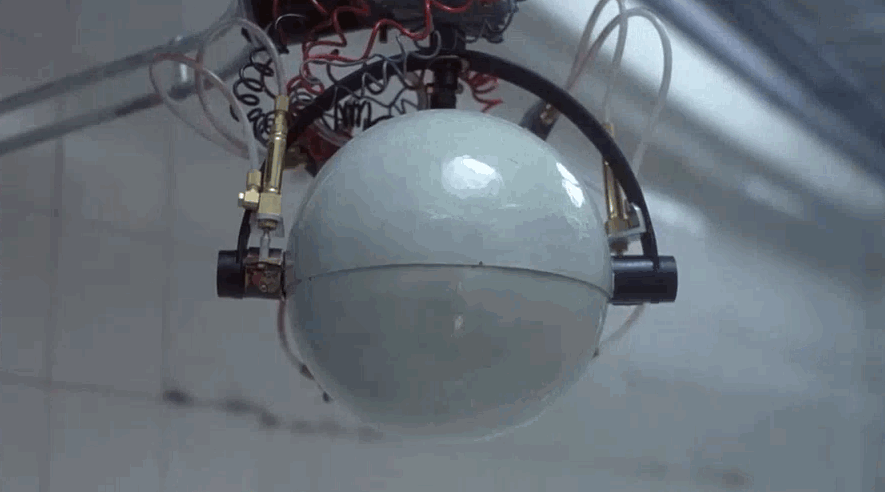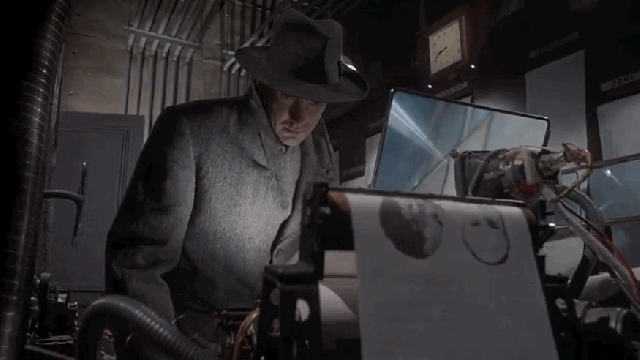Terry Gilliam’s classic dystopian satire has only gotten more relevant since it came out. Brazil finds its humour in bleak places, mapping out an alternate reality where oppressive state-implemented paranoia makes everyone scared of each other.
I’d been planning to re-watch Brazil for a few weeks now and pitched something on it long before the election. It’s my favourite movie ever but I couldn’t remember the last time I’d sat down with Terry Gilliam’s dark masterpiece. To watch it now, 31 years after its initial release, is to realise that some of the grimmest imaginings of its surveillance-state reality have become facts of life.
Brazil opens with the seductive coo of consumerism-as-opiate. A commercial about buying new ducts plays as a man pushing a shopping cart walks by a storefront, only to suddenly explode in a terrorist bombing. Bombs keep on exploding in Brazil and, victims excepted, the vast majority of people in the this darkly funny dystopian movie carry on like nothing’s happening.
Bureaucratic incompetence is masked by euphemistic doublespeak and obliviousness. Politicians refer to a 13-year bombing campaign as beginner’s luck, blather on about “bad sportsmanship” and “good old-fashioned virtues” and say that terrorists “just can’t stand seeing the other fellow win.” Torture and rendition are “information retrieval” and propaganda posters tell citizens “don’t suspect a friend, report them.” This mode of satire wasn’t brand new when Brazil debuted in December 1985. What makes the execution exemplary here is in the little details that make the hopelessness feel ubiquitous.
In Brazil, a paperwork mistake by the all-seeing, all-knowing Ministry of Information leads to innocent man Archibald Buttle being arrested instead of rogue heating engineer Archibald Tuttle, who’s a suspected terrorist. Jonathan Pryce plays Sam Lowry, an unambitious office drone trying to smooth over the mistake. Sam doesn’t have much by way of ambition and is happy to be overlooked in the grey-flannel purgatory he lives inside of.
In one of the film’s best-known sequences, Sam’s mum tells him he needs to grow up and accept responsibility as she’s getting her skin stretched via freaky hyper-plastic surgery. He can’t acquiesce to letting middle-management careerism work as a substitute for true purpose. The only thing that energizes Sam are the dreams where he’s a glam-fantasy superhero fighting against oppressive superstructures, and trying to save a woman who’s been abducted.
Plot coincidence makes it turn out that Buttle’s neighbour is Sam’s dream woman is Jill Layton, a cantankerous truck driver who’s trying to protest the wrongful abduction of her neighbour by the Ministry of Information. Sam’s attempts to paper over the mistake that led to Buttle’s arrest and eventual death by torture make up the bulk of the movie, along with his pursuit of Jill. His willful obliviousness to the inhumanity of the system he works for gradually falls away, only to be replaced by a change in status that makes him an enemy of the state.
British accents abound in the film but Brazil doesn’t specify that where it’s happening. It’s an oppressive anyplace where people disappear without warning. Brazil is very much a reaction to the policies and attitudes of Thatcher-era Britain, which was fraught by political unrest and discontentment. Snatches of dialogue evoke a bitter national mood. An uptight old lady objects to Sam littering the streets with paperwork, saying “Can’t you read English? You illiterate foreign pig! You come here from your own filthy country and think you can mess our streets up!”
During their first encounter, Harry Tuttle tells Sam, “this whole system of yours could be on fire and I couldn’t even turn on a kitchen tap without filling out a 27B/6… Now they got the whole country sectioned off. You can’t make a move without a form.” Later, Jill asks Sam, “Doesn’t it bother you, the sort of thing you do at Information Retrieval?” He scoffs and replies, “What? I suppose you’d rather have terrorists.”
Weightier signals like those exchanges form the skeleton of Brazil’s thematics but it’s really the little things about Brazil that endear it to me. Spearheaded by production designer Norman Garwood, the overall aesthetic leans hard on throwback styling that harkens back to golden-age and post-war Hollywood, channeling an air of timelessness. But invoking that time period also acts as a commentary on the miasmic nature of nostalgia, telling the viewer that the goold old days weren’t as bucolic as they’d like to believe.
The audience also gets constant reminders the Rube Goldbergian logic of Brazil‘s fiction via the overly complicated, constantly malfunctioning contraptions and fantastic set design. Most of the working and living spaces — even the luxurious apartment owned by Sam’s mother — are overrun with wires, ducts and gimcrackery. What we see of the panopticon technology in Brazil isn’t sleek and forward-looking. It’s a series of clownishly cobbled together devices whose freakish appearance heighten the existential dread emanating off the screen.

The sets are amazing, with office buildings and fortress-styled residential blocks done up in lifeless grey tones and brutish outlines or high-end apartments and restaurants with just enough shabbiness to project a sense of systemic deprivation. Simply by looking at the environments and set dressing, you can tell this is a world where it’s hard for people to eke out the smallest of dignities.
These characters all live in a system that’s horrifically dehumanising and Sam slowly comes to live in defiance of that truth. Most other people in Brazil are concerned with either protecting the socioeconomic status they currently hold or climbing up the ladder. When Deputy Minister John Helpmann gets the name of a woman wrong, calling her Barbara instead of Allison, the woman’s husband calls her Barbara, too, rather than correct the well-connected muckety-muck. When he continues to call Allison Barbara, it’s a chilling example of the kind of fear that undergirds the whole movie.
Other leitmotifs drive home the wrongness of the world. Kids are constantly playing with guns or cursing out their elders and a woman transcribing a torture session treats it like just another ho-hum task. There’s a caustic rueful paranoia writhing underneath all of the movie’s madcap slapstick humour, which comes to a head in the film’s feverish final sequences. Sam’s dream of a heroic, romantic destiny and individual freedom get ground up by the gears of the system he was heedlessly complicit in. Brazil may come across as naive and heavy-handed sometimes but it’s still a powerful fable of what can happen when you don’t pay attention to the world around you.
